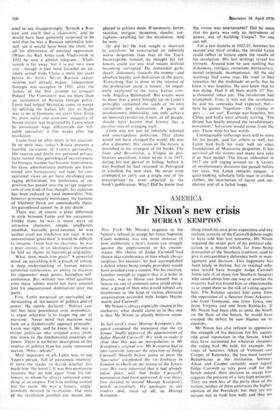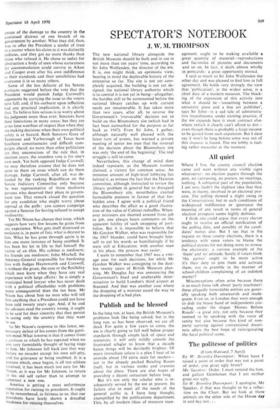AMERICA
Mr Nixon's new crisis
MURRAY KEMPTON
New York—Mr Nixon's response to the Senate's refusal to accept his latest Supreme Court nominee was one more instance of how stubbornly a man's nature can struggle against the improvement in his circum- stance. His choice of Judge Carswell had shown that carelessness in him which ahvays surprises his enemies; he had accomplished a defeat where being simply provident would have avoided even a contest. Yet his reaction, familiar enough to suggest that it is habit in disaster, was to blame not himself but a Senate no one of common sense could recog- nise; a group of men who would subject any Southerner to 'the kind of vicious character assassination accorded both Judges Hayns- worth and Carswell'.
Mr Nixon is always especially sincere in his outbursts; what should alarm us in this one is that Mr Nixon so plainly believes some- In last week's issue Murray Kernpton's dis- patch contained the statement that the us Senate 'finally approved the appointment of Judge Harold Carswell'. We wish to make it clear that this was an interpolation in Mr Kernpton's original text. Mr Kernpton had in fact correctly forecast the rejection of Judge Carswell. Shortly before going to press the 'Spectator' telephoned the us Embassy in London to check on the timing of the Senate vote. We were informed that it had already taken place, and that Judge Cars well's nomination had been approved. It was there- fore decided to amend Murray Kempton's article accordingly. We apologise to our readers and, most of all, to Murray Kempton. thing which his own prior experience and any realistic scrutiny of the Carswell debate ought to have told him was nonsense. Mr Nixon acquired the major part of his political edu- cation in a Senate which, far from being distrustful of the Southern tradition, used to give it extraordinary deference both in man- agement and decision. This hegemony has been lately in decline; but its residual influ- ence would have brought Judge Carswell home safe if, of those few Southern Senators who cared about him one way or another the majority had not found him so objectionable as to impel them to the risk of voting against him. The balance against him came from the opposition of a Senator from Arkansas, one from Tennessee, one from Texas, one from Virginia and one from Kentucky. If Mr Nixon had been able to unite the South on the floor of the Senate, he would have escaped the defeat he now blames on its enemies.
Mr Nixon has also refused to appreciate the strength of his decision for his success and good reputation in the Senate, which may have accounted for whatever closeness the voting had. He held, for example, the votes of Senators Aiken of Vermont and Cooper of Kentucky, the two most revered Republicans in the institution. Senators Aiken and Cooper certainly must regard Judge Carswell as very poor stuff for the bench indeed; their decision to accept him suggests the pressure of a very high principle. They are men less of the party than of the nation; neither of them entertains the highest opinion of the President; but they are too serious not to wish him well; and they are
aware of the damage to the country in the continued distrust of one branch of its government by another. What they did, then, was to offer the President a tender of trust in a matter where his claim to it was distinctly dubious, and they got no more thanks than those who refused it. He chose to indict for obstruction a body of men whose earnestness for accommodation could survive in Aiken and Cooper even after his own indifference to their standards and their sensibilities had overcome it in so many others.
Some of the less delicate of his Senate partisans suggested before the vote that the President would punish Judge Carswell's opponents by carrying the issue to the voters next fall; and, if his outburst upon reflection had any practical implication, it is clearly that. To believe him serious is to worry about his judgment more than ever. Senators have their limitations in many areas; but they are at no time worthier of respect than when they are making decisions when their own political safety is at hazard. Both Senators Gore of Tennessee and Yarborough of Texas have Southern constituencies and difficult cam-, paigns ahead; no more than other politicians are they unconscious of the rule that, in election years, the soundest vote is for one's own neck. Yet both opposed Judge Carswell; we may therefore assume that he does not seem to them an issue which can do them damage. Judge Carswell, after all, was de- fended by the ranking Republican on the Senate Judiciary Committee only because he was representative of those Mediocre persons who deserved their place in govern- ment too. That remark closed the question for any candidate who might worry about reprisal at the polls: you cannot campaign against a Senator for having refused to accept mediocrity.
Yet Mr Nixon has chosen that issue, which suggests how very few lessons he gains from any experience. What gets itself dismissed as mediocre is, in point of fact, what is dearest to him. What he has gone through again is to him one more instance of being snubbed. It has been his lot in life to feel himself the victim of an elite. His cabinet is mediocre; his friends are mediocre; John Mitchell, the Attorney-General responsible for burdening him with Judges Haynsworth and Carswell, is without the grace, the care or the flexibility. which men learn when they have any real experience with large affairs: he is simply a municipal bond lawyer who has never dealt with a political officeholder with problems more consequential than the tax base. Mr Nixon has about him no man who will tell him anything that a President could not have been told twenty years ago. And, if he and his advisers read the country wrong, it ought to be said for their sincerity that they persist in seeing only the country that they want to see.
So Mr Nixon's response to this latest, un- necessary defeat of his comes from the garri- son mind. What is worse is that it comes from a garrison to which he has repaired when no one very formidable thought of laying siege to him. Mr Johnson fell back just that way before no invader except his own self-pity, and his grievance at being snubbed. It is a process which, once begun, is all too seldom reversed; it has been much too easy for Mr Nixon, as it was for Mr Johnson, to return to his old self rather than to attempt to construct a new one.
America is getting a most unfortunate reputation for ruining its presidents. It ought to be remembered, in fairness to us, that our Presidents have lately shown a dreadful weakness for ruining themselves.







































 Previous page
Previous page